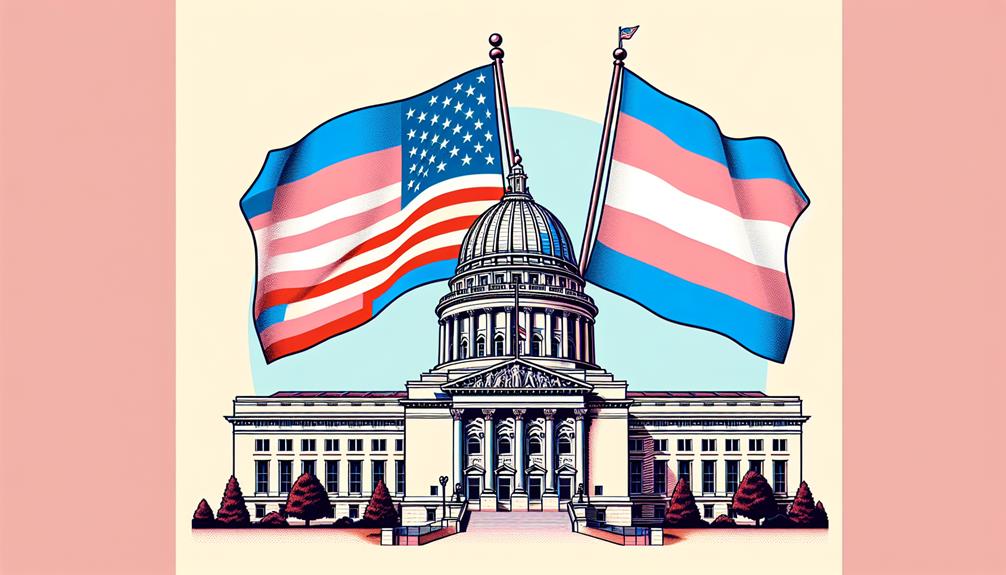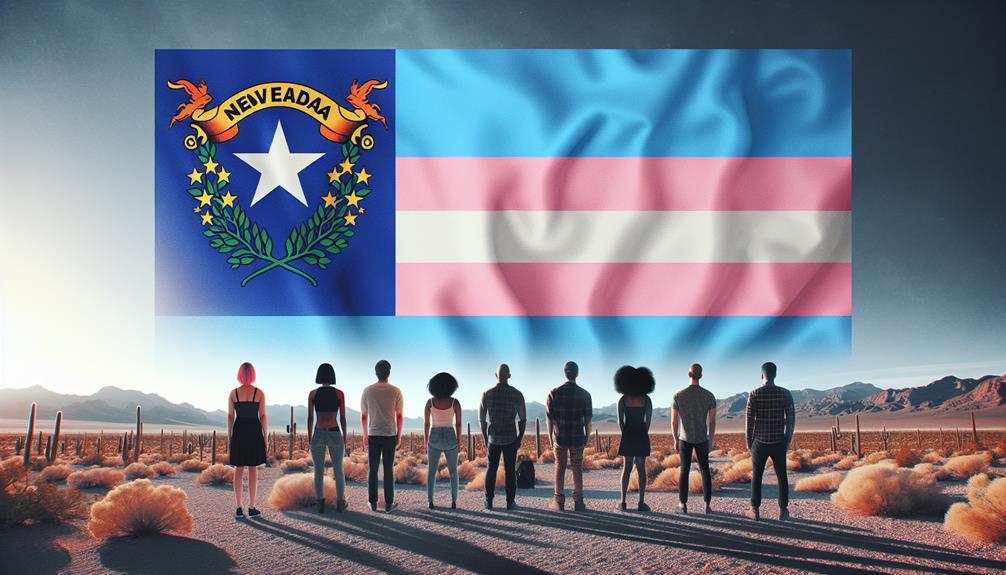
Table of Contents
ToggleIdaho Transgender State of Affairs
Amidst the rugged beauty of Idaho’s landscape, a storm of controversy rages in the realm of transgender rights. The recent legislation signed into law by Governor Brad Little has cast a shadow over the state’s approach to gender-affirming care for transgender youth.
The implications are far-reaching, sparking debates on healthcare access, discrimination protections, and the rights of transgender individuals in schools and workplaces. As the legal and societal battles unfold, it becomes increasingly vital to understand the multifaceted impact of these developments on the transgender community and the broader fabric of Idaho’s society.
Key Takeaways
- Idaho’s House Bill 71 criminalizes gender-affirming care for transgender youth, imposing severe punishments.
- Legal challenges to gender-affirming care bans have shown a divide in courts, complicating the issue.
- The ban on gender-affirming care is causing distress and exacerbating healthcare challenges for transgender minors in Idaho.
- Inclusivity, understanding, and creating supportive environments are crucial in addressing discrimination and safeguarding the rights of transgender individuals.
Legislative Developments Impacting Transgender Rights
The recent legislative developments in Idaho have had a significant impact on the rights of transgender individuals, particularly concerning gender-affirming care for youth.
Idaho’s House Bill 71, signed into law by Governor Little, criminalizes gender-affirming care for transgender youth, making it a felony to provide certain types of medical care to children and teens with gender dysphoria. This law, set to take effect on January 1, 2024, imposes severe punishments of up to 10 years in prison for providing gender-affirming care.
The legislation has sparked intense debate, with supporters emphasizing the protection of minors from irreversible damage, while opponents argue that withholding gender-affirming care may lead to negative long-term consequences.
Legal challenges to gender-affirming care bans have shown a divide in courts, with lower level courts blocking bans, while appeals courts have sided with states, leading to ongoing discussions about the rights of parents and the well-being of transgender minors.
The new law has drawn opposition from various quarters, with concerns raised over potential increases in suicide rates among transgender youth and the violation of rights, leading to ongoing legal and societal debates surrounding gender-affirming care for transgender individuals.
Healthcare Access and Challenges
Amid the legislative developments impacting transgender rights, concerns arise regarding the healthcare access and challenges faced by transgender youth in Idaho. The new law in Idaho criminalizes gender-affirming care for minors, including crucial treatments such as puberty blockers and hormones. This has led to a distressing situation for transgender youth and their families, as they’re now facing significant barriers to accessing essential healthcare.
With the ban set to take effect on January 1, 2024, the transgender community in Idaho is grappling with uncertainty and fear about their future well-being. The Supreme Court’s stance on similar bans in other states further adds to the anxiety and unease among transgender youth and their healthcare providers.
Transgender youth in Idaho are being denied access to crucial gender-affirming treatments. The ban on gender-affirming care is causing distress and exacerbating the challenges faced by transgender minors. Families of transgender youth are struggling with the uncertainty and fear of being unable to access essential healthcare for their children. The legal battles surrounding gender-affirming care bans have created additional anxiety and unease for the transgender community in Idaho.
The situation demands urgent attention and support for the transgender youth in Idaho who are currently facing significant healthcare challenges.
Discrimination Protections and Legal Battles
Legal battles over discrimination protections for transgender youth have intensified in Idaho, with conflicting court rulings and public opinion adding to the complexity of the situation.
The recent passing of House Bill 71, criminalizing gender-affirming care for transgender youth, has sparked intense debate. This law prohibits gender-affirming health care, including puberty blockers and hormones, for individuals under 18, with potential severe penalties.
The American Civil Liberties Union (ACLU) has been at the forefront of legal challenges, emphasizing the importance of providing gender-affirming medical care to transgender youth. On the other hand, proponents of the law argue that it’s necessary for protecting minors from surgeries that they may later regret.
Public opinion is divided, with many supporting the ban while others argue that it interferes with loving parents’ decisions and denies essential medical care to transgender youth.
The courts’ differing stances on similar bans in other states further complicate the issue. Ultimately, the legal battles and public discourse highlight the critical role that society plays in protecting minors and ensuring equitable access to transgender health care.
Gender Identity in Schools and Workplaces
Inclusivity and understanding are crucial in creating supportive environments for individuals navigating gender identity in schools and workplaces. The recent anti-LGBTQ bills passed by the Idaho House and Senate have brought the issue of gender identity to the forefront, impacting the lives of transgender children and non-binary youth.
Denying access to gender-affirming care, including hormone therapy, not only affects their physical well-being but also their mental health and overall child welfare. The legal battles surrounding these discriminatory laws have left the community feeling uncertain about their rights and safety in educational and professional settings.
It’s imperative to recognize the emotional toll these laws take on transgender and non-binary individuals, as they strive to be their authentic selves in environments that may not fully understand or support their gender dysphoria.
Creating inclusive policies and fostering a culture of acceptance in schools and workplaces is essential to ensure the well-being and success of all individuals, regardless of their gender identity.
Stakeholder Support and Opposition
Stakeholder support and opposition regarding the recent anti-LGBTQ bills in Idaho have sparked intense advocacy from both sides, with significant backing for the legislation and strong opposition from various groups and organizations.
The bill criminalizing gender-affirming care has garnered substantial support, with over 14,800 emails and calls urging the governor to sign it. However, opposition to the bill is also robust, with more than 150 major U.S. corporations voicing their disapproval of anti-transgender legislation.
While the bill has received more support than opposition, the ACLU of Idaho and affected families are actively seeking plaintiffs for a potential lawsuit against the legislation, highlighting the depth of resistance. Major medical organizations, including the American Medical Association and the American Academy of Pediatrics, are also staunchly opposing the bill, advocating for gender-affirming care for youth.
This issue has ignited debates about the government’s role in interfering with loving parents’ decisions and potentially irreversibly damaging the healthy development of children. It has become a focal point for advocates seeking to protect the rights and well-being of LGBTQ+ people, emphasizing the importance of safeguarding human rights and not banning gender-affirming care.
Frequently Asked Questions
How Old Do You Have to Be to Start HRT in Idaho?
In Idaho, individuals typically need to be at least 16 years old to begin hormone replacement therapy (HRT) with medical supervision and parental consent. Before starting HRT, a mental health evaluation is usually required to ensure readiness and provide emotional support.
Informed consent and community resources are essential for navigating physical changes and addressing legal implications. It’s crucial for individuals to have access to supportive healthcare providers and resources as they navigate their gender-affirming journey.
Final Thoughts
The state of transgender rights in Idaho is like a tangled web, with legislative developments impacting healthcare access, discrimination protections, and gender identity in schools and workplaces. While supporters believe they’re protecting children, opponents argue that denying gender-affirming care can have negative long-term consequences.
It’s a complex and ongoing battle, but with continued support and advocacy, the hope is that all individuals, regardless of gender identity, can access the necessary care and protections they deserve.
Profile Author / Editor / Publisher
- Dora Saparow
- Dora Kay Saparow came out in a conservative Nebraskan town where she faced both misunderstanding and acceptance during her transition. Seeking specialized support, she moved to a big city, where she could access the medical, legal, and social resources necessary for her journey. Now, twelve years later, Dora is fully transitioned, happily married, and well-integrated into society. Her story underscores the importance of time, resources, and community support, offering hope and encouragement to others pursuing their authentic selves.
Latest entries
 News and AdvocacyNovember 14, 2025Rainbow Victories: 2025’s Most Pro-LGBTQ+ States Revealed
News and AdvocacyNovember 14, 2025Rainbow Victories: 2025’s Most Pro-LGBTQ+ States Revealed News and AdvocacyNovember 14, 2025Transgender Sanctuary States: Protecting Rights, Providing Hope
News and AdvocacyNovember 14, 2025Transgender Sanctuary States: Protecting Rights, Providing Hope Featured PostsNovember 13, 2025When Restroom Policing Backfires: The Hotel That Went Too Far
Featured PostsNovember 13, 2025When Restroom Policing Backfires: The Hotel That Went Too Far Featured PostsNovember 13, 2025Sex, Safety, and Seduction: A Trans Girl’s Guide to Hookups
Featured PostsNovember 13, 2025Sex, Safety, and Seduction: A Trans Girl’s Guide to Hookups

























